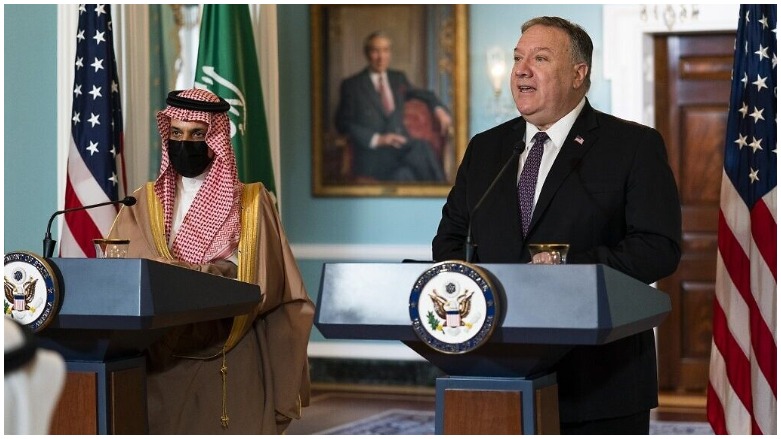US initiates 'Strategic Dialogue' with Saudi Arabia

WASHINGTON DC (Kurdistan 24) – The Foreign Minister of Saudi Arabia, Faisal bin Farhan Al-Saud, visited Washington on Wednesday and met with the US Secretary of State, Mike Pompeo, to launch the US-Saudi “Strategic Dialogue.”
Saudi Arabia is the third Arab country with which the US has initiated such a diplomatic process.
The first was Qatar, and the first meeting of the US-Qatari Strategic Dialogue was held in January 2018.
Qatar has great strategic importance for the US, because its Al Udeid Air Base hosts the largest US military presence in the Middle East and serves as the forward headquarters of US Central Command (CENTCOM.)
The Trump administration has recently expanded the concept of the Strategic Dialogue to include other Arab states. Iraq, whose prime minister visited Washington in August, was the second such country.
Read More: The US-Iraq Strategic Dialogue: Good news for the Kurdistan Region
A third round of the US-Qatari Strategic Dialogue was held in September, when the Deputy Prime Minister and Foreign Minister, Mohammed bin Abdulrahman Al Thani, visited Washington.
Another Strategic Dialogue will be initiated with the United Arab Emirates (UAE) next week, when senior Emirati officials visit Washington.
US Commitment to Saudi Arabia
Pompeo and Al Saud held a joint press conference on Wednesday, and Pompeo began by announcing that the US was undertaking a major initiative to build new diplomatic facilities in the Kingdom. He characterized it as reflecting “a mutual willingness to grow not only our security and economic ties, but our whole partnership.”
The US is “preparing to acquire a 26-acre site for a new US embassy in Riyadh,” Pompeo announced. The US has recently opened a new consulate in the port city of Jeddah, on Saudi Arabia’s Red Sea Coast, some 100 kilometers west of Mecca, and it is building a new consulate in Dhahran, the center of the Saudi oil industry.
That construction, in total, “represents a US investment of over $1 billion,” Pompeo said.
Shared view of Iranian Expansionism
A common perspective on Iran is a key premise underlying the US-Saudi Strategic Dialogue, and Pompeo suggested it was a major issue in their discussions.
“We had thorough conversations on regional security,” Pompeo said. “It’s no secret that Iran’s destabilizing behavior threatens Saudi Arabia’s security and disrupts global commerce,” as he noted Iran’s ballistic missile attacks on Saudi oil facilities last September.
Read More: Pompeo calls attacks on Saudi oil facilities 'act of war,' as Trump promises new Iran sanctions
Pompeo also cited “the frequent, ongoing Houthi bombardment of Saudi territory” from Yemen, “using rockets, drones, and other lethal technology supplied by the regime in Tehran.”
“Today, we reaffirmed our mutual commitment to countering Iranian malign action, and the threat it poses to regional security and prosperity, and the security of the American people as well,” Pompeo stated.
Al Saud spoke similarly. “The Houthis have launched more than 300 Iranian-made ballistic missiles and drones toward the Kingdom,” the Saudi Foreign Minister stated, as he also noted the threat posed by Iran’s nuclear program, while affirming Saudi Arabia’s commitment to “deter Iran’s destabilizing behavior.”
The “Abraham Accords”
The Abraham Accords refer to the recent agreements between Israel and the UAE and Israel and Bahrain on normalizing relations.
Read More: Israel signs accords with UAE, Bahrain
Pompeo indicated that Riyadh had been helpful in promoting the agreements, but also suggested that the US would like to see more.
“We want to thank” the Saudis for their assistance “in the success of the Abraham Accords, so far,” Pompeo said, but “we hope Saudi Arabia will consider normalizing its relationships as well,” and “we hope, too, that the Kingdom will encourage the Palestinian side to return to dialogue and negotiation with Israel.”
One way in which Riyadh contributed to the Abraham Accords was by concluding an understanding with Israel that allowed for both parties to use each other’s airspace for commercial flights.
That, in turn, led to an agreement between Israel and Jordan, concluded last Thursday, which permits several Arab countries, including Iraq, to use Israeli and Jordanian airspace for commercial flights.
On Wednesday, the first flight by a UAE airline company, Etihad Airways, flew over Israeli airspace in a trip from Milan, Italy to Abu Dhabi, shaving 90 minutes off the previous route.
Yet Saudi Arabia has declined, at least so far, to normalize its own ties with Israel, and the Foreign Minister did not respond to Pompeo’s remarks.
Editing by John J. Catherine
